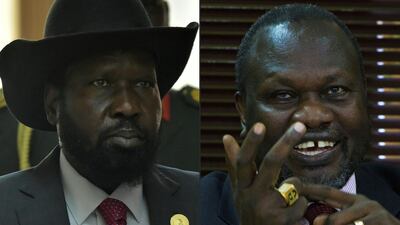The key belligerents in South Sudan’s civil war met in Addis Ababa on Thursday to rescue a crumbling peace deal designed to end five years of violence.
With only 10 days to go until a unity government is due to be formed, rebel leader Riek Machar met representatives of his nemesis, President Salva Kiir, in the Ethiopian capital under the auspices of Igad, East Africa’s answer to the GCC.
The race is on to cement a September accord, which will see Mr Machar return as Mr Kiir’s vice president, five years after the leader accused him of plotting a coup, plunging the world’s youngest country into civil war.
A 36-month unity government is mandated to rule until elections in 2022, while the forces of both men will theoretically be incorporated into one national army.
But the peace process is collapsing and negotiations are yet to begin on a series of crucial issues, including security control of the capital, Juba, and the federal make-up of the country.
Igad said the meeting was to “develop a clear roadmap” for the creation of a government and tackle outstanding issues.
"There is clearly a deadlock at the moment but the regional community is seeking to keep on track," Ahmed Soliman, a research fellow at Chatham House's Africa programme, told The National.
Observers question the appetite of both parties for peace.
Last month, Mr Kiir and Mr Machar attended a Vatican retreat where, in an extraordinary gesture, Pope Francis kissed their feet.
Since then, Mr Machar, who is in exile in Khartoum, has requested a six-month delay, claiming security concerns.
A peace deal in 2016 collapsed within months, forcing Mr Machar to flee on foot under gunfire.
“You need willing partners and that is really the key obstacle in South Sudan,” said Mr Soliman, who was “pessimistic” about the prospects for peace.
This week it emerged that Mr Kiir had hired American lobbyists to block a possible South Sudan war crimes tribunal, which was part of the peace deal and a key confidence-building measure.
Since the Kiir-Machar relationship unravelled in 2013, about 380,000 people have been killed and more than four million uprooted.
Brutality and rape have been used by Mr Kiir’s Dinka soldiers and his former deputy’s Nuer militias.
"Our monitoring of press reports indicates that the frequency of fighting so far in 2019 is more than 60 per cent lower than in the three months prior to the signing of the peace accord," said Thomas Murphy, an intelligence analyst at The Risk Advisory Group.
And yet sporadic violence has flared along the southern border with Uganda and the Democratic Republic of Congo, Mr Murphy said.
He said this was testament to the way in which the conflict has spread, drawing in other armed groups who are not signatories to the deal.
The peace process sustained a blow last month with the fall of Sudanese president Omar Al Bashir, who had become a key broker.
Khartoum, focused on resolving its own challenges, is now in no position to mediate the conflict to its south.
All eyes now turn to Igad and the talks in Addis Ababa.
“Any further uncertainty coming out of this meeting would be very negative for the peace process,” Mr Soliman said.

